Team Work Management Assignment: Leadership, Teamwork and Reflection
VerifiedAdded on 2023/03/20
|8
|2176
|67
Report
AI Summary
This report presents a reflective analysis of a team work management assignment undertaken by a student. The assignment involved a group presentation on workplace diversity, with team members from diverse cultural backgrounds. The student, representing India, details the challenges and successes encountered throughout the project, including initial disagreements, communication barriers, and the eventual development of a cohesive team. The report highlights positive aspects such as learning about different cultures and the importance of teamwork, while also acknowledging negative aspects like the lack of formal leadership and language barriers. The student applies Gibbs' reflective cycle to analyze the experience, emphasizing the importance of team dynamics, leadership, and the need for improved communication and planning in future scenarios. The report concludes with suggestions for improvement, including better initial interactions, the establishment of clear agendas, and the appointment of a team leader, to enhance the overall team experience and project outcomes. The report is a valuable resource for students studying team work, leadership, and cross-cultural communication.
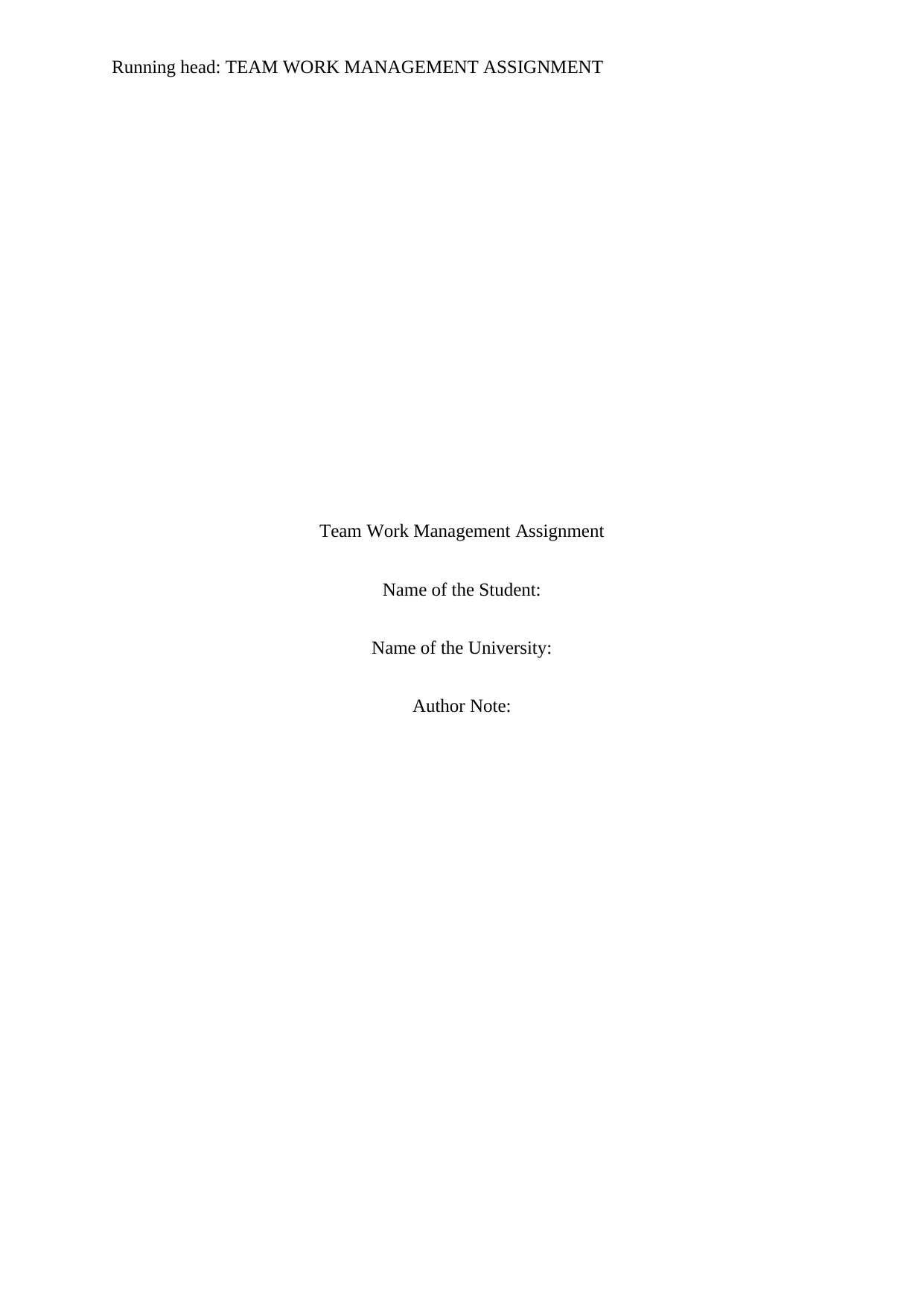
Running head: TEAM WORK MANAGEMENT ASSIGNMENT
Team Work Management Assignment
Name of the Student:
Name of the University:
Author Note:
Team Work Management Assignment
Name of the Student:
Name of the University:
Author Note:
Paraphrase This Document
Need a fresh take? Get an instant paraphrase of this document with our AI Paraphraser
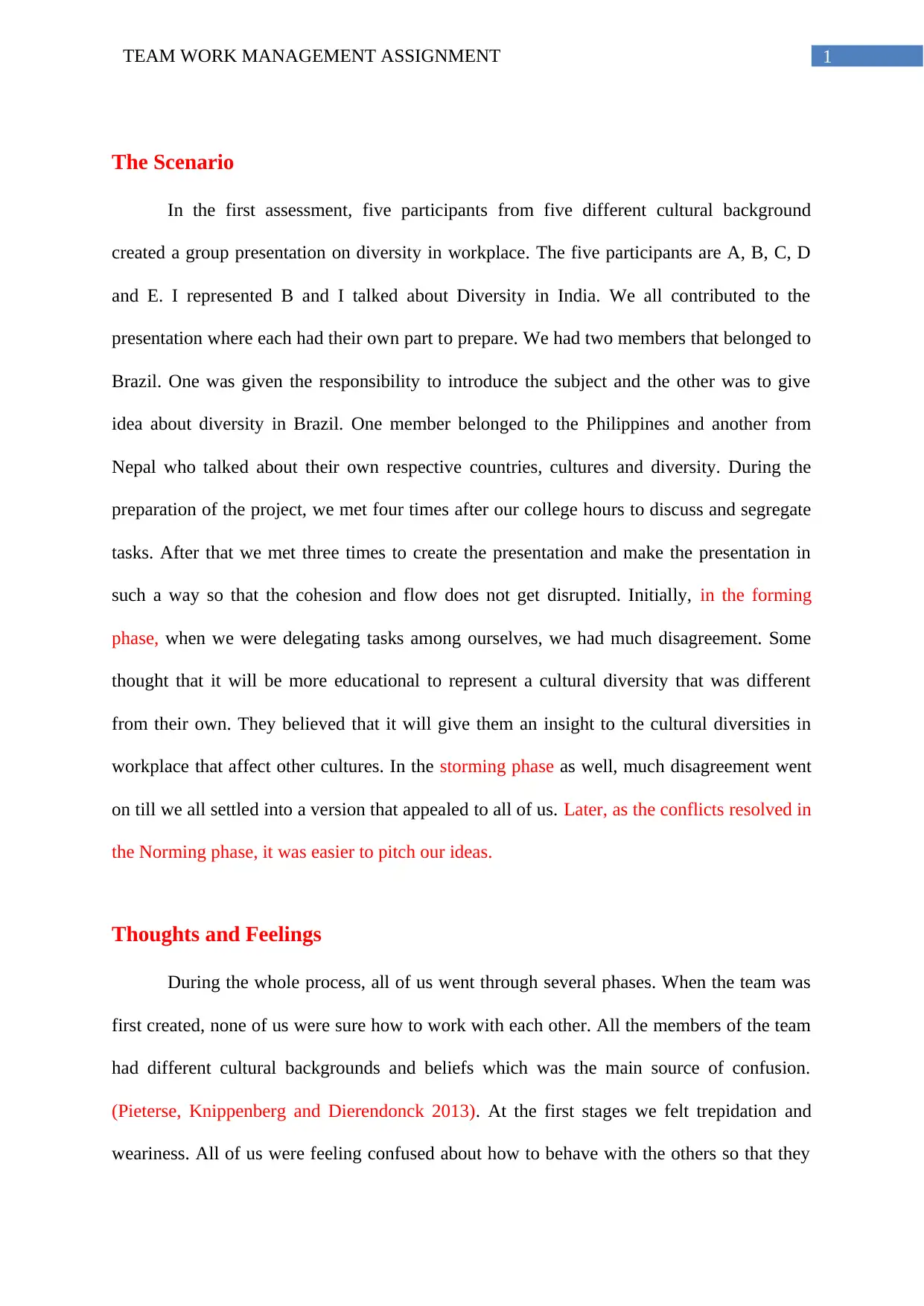
1TEAM WORK MANAGEMENT ASSIGNMENT
The Scenario
In the first assessment, five participants from five different cultural background
created a group presentation on diversity in workplace. The five participants are A, B, C, D
and E. I represented B and I talked about Diversity in India. We all contributed to the
presentation where each had their own part to prepare. We had two members that belonged to
Brazil. One was given the responsibility to introduce the subject and the other was to give
idea about diversity in Brazil. One member belonged to the Philippines and another from
Nepal who talked about their own respective countries, cultures and diversity. During the
preparation of the project, we met four times after our college hours to discuss and segregate
tasks. After that we met three times to create the presentation and make the presentation in
such a way so that the cohesion and flow does not get disrupted. Initially, in the forming
phase, when we were delegating tasks among ourselves, we had much disagreement. Some
thought that it will be more educational to represent a cultural diversity that was different
from their own. They believed that it will give them an insight to the cultural diversities in
workplace that affect other cultures. In the storming phase as well, much disagreement went
on till we all settled into a version that appealed to all of us. Later, as the conflicts resolved in
the Norming phase, it was easier to pitch our ideas.
Thoughts and Feelings
During the whole process, all of us went through several phases. When the team was
first created, none of us were sure how to work with each other. All the members of the team
had different cultural backgrounds and beliefs which was the main source of confusion.
(Pieterse, Knippenberg and Dierendonck 2013). At the first stages we felt trepidation and
weariness. All of us were feeling confused about how to behave with the others so that they
The Scenario
In the first assessment, five participants from five different cultural background
created a group presentation on diversity in workplace. The five participants are A, B, C, D
and E. I represented B and I talked about Diversity in India. We all contributed to the
presentation where each had their own part to prepare. We had two members that belonged to
Brazil. One was given the responsibility to introduce the subject and the other was to give
idea about diversity in Brazil. One member belonged to the Philippines and another from
Nepal who talked about their own respective countries, cultures and diversity. During the
preparation of the project, we met four times after our college hours to discuss and segregate
tasks. After that we met three times to create the presentation and make the presentation in
such a way so that the cohesion and flow does not get disrupted. Initially, in the forming
phase, when we were delegating tasks among ourselves, we had much disagreement. Some
thought that it will be more educational to represent a cultural diversity that was different
from their own. They believed that it will give them an insight to the cultural diversities in
workplace that affect other cultures. In the storming phase as well, much disagreement went
on till we all settled into a version that appealed to all of us. Later, as the conflicts resolved in
the Norming phase, it was easier to pitch our ideas.
Thoughts and Feelings
During the whole process, all of us went through several phases. When the team was
first created, none of us were sure how to work with each other. All the members of the team
had different cultural backgrounds and beliefs which was the main source of confusion.
(Pieterse, Knippenberg and Dierendonck 2013). At the first stages we felt trepidation and
weariness. All of us were feeling confused about how to behave with the others so that they
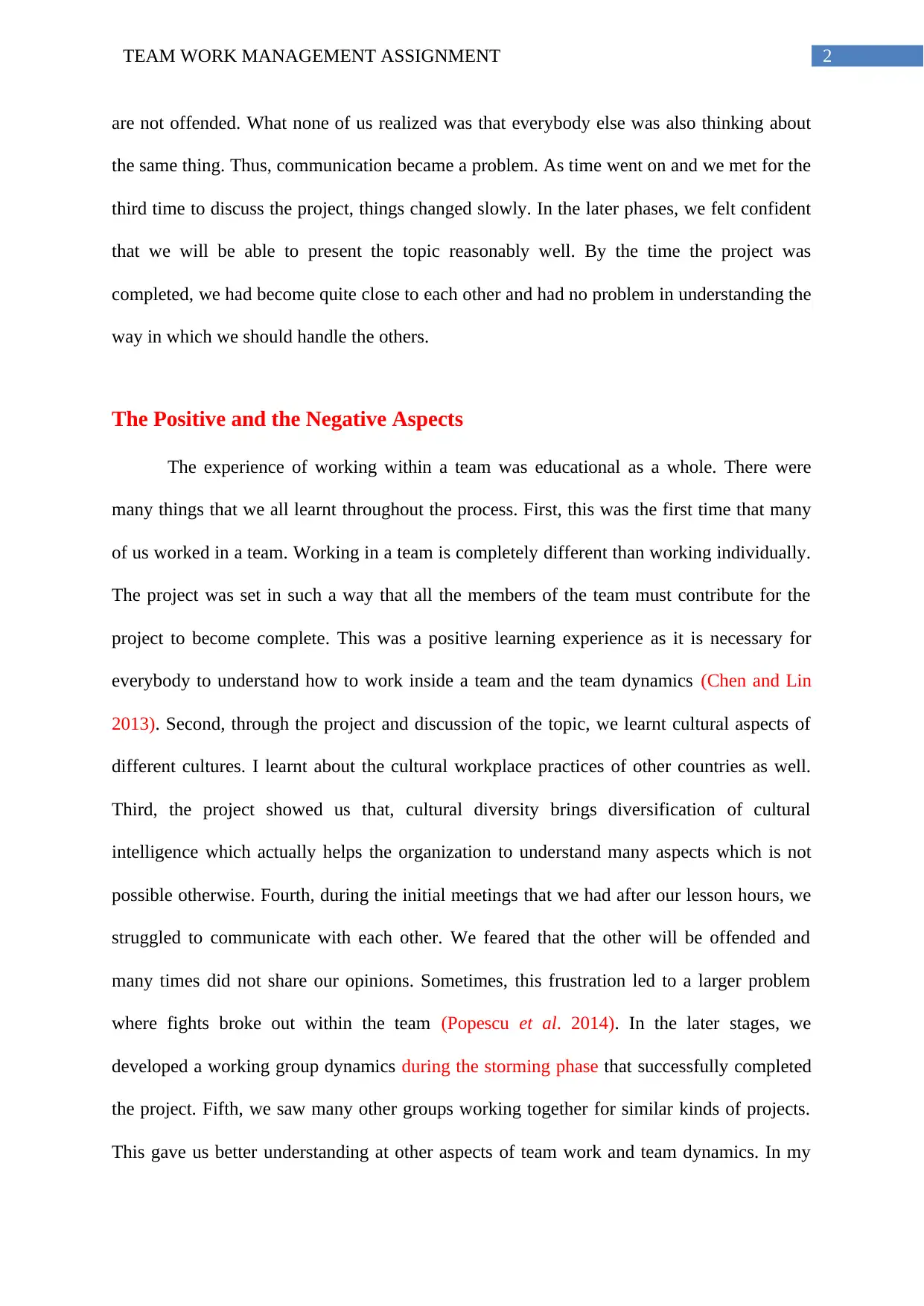
2TEAM WORK MANAGEMENT ASSIGNMENT
are not offended. What none of us realized was that everybody else was also thinking about
the same thing. Thus, communication became a problem. As time went on and we met for the
third time to discuss the project, things changed slowly. In the later phases, we felt confident
that we will be able to present the topic reasonably well. By the time the project was
completed, we had become quite close to each other and had no problem in understanding the
way in which we should handle the others.
The Positive and the Negative Aspects
The experience of working within a team was educational as a whole. There were
many things that we all learnt throughout the process. First, this was the first time that many
of us worked in a team. Working in a team is completely different than working individually.
The project was set in such a way that all the members of the team must contribute for the
project to become complete. This was a positive learning experience as it is necessary for
everybody to understand how to work inside a team and the team dynamics (Chen and Lin
2013). Second, through the project and discussion of the topic, we learnt cultural aspects of
different cultures. I learnt about the cultural workplace practices of other countries as well.
Third, the project showed us that, cultural diversity brings diversification of cultural
intelligence which actually helps the organization to understand many aspects which is not
possible otherwise. Fourth, during the initial meetings that we had after our lesson hours, we
struggled to communicate with each other. We feared that the other will be offended and
many times did not share our opinions. Sometimes, this frustration led to a larger problem
where fights broke out within the team (Popescu et al. 2014). In the later stages, we
developed a working group dynamics during the storming phase that successfully completed
the project. Fifth, we saw many other groups working together for similar kinds of projects.
This gave us better understanding at other aspects of team work and team dynamics. In my
are not offended. What none of us realized was that everybody else was also thinking about
the same thing. Thus, communication became a problem. As time went on and we met for the
third time to discuss the project, things changed slowly. In the later phases, we felt confident
that we will be able to present the topic reasonably well. By the time the project was
completed, we had become quite close to each other and had no problem in understanding the
way in which we should handle the others.
The Positive and the Negative Aspects
The experience of working within a team was educational as a whole. There were
many things that we all learnt throughout the process. First, this was the first time that many
of us worked in a team. Working in a team is completely different than working individually.
The project was set in such a way that all the members of the team must contribute for the
project to become complete. This was a positive learning experience as it is necessary for
everybody to understand how to work inside a team and the team dynamics (Chen and Lin
2013). Second, through the project and discussion of the topic, we learnt cultural aspects of
different cultures. I learnt about the cultural workplace practices of other countries as well.
Third, the project showed us that, cultural diversity brings diversification of cultural
intelligence which actually helps the organization to understand many aspects which is not
possible otherwise. Fourth, during the initial meetings that we had after our lesson hours, we
struggled to communicate with each other. We feared that the other will be offended and
many times did not share our opinions. Sometimes, this frustration led to a larger problem
where fights broke out within the team (Popescu et al. 2014). In the later stages, we
developed a working group dynamics during the storming phase that successfully completed
the project. Fifth, we saw many other groups working together for similar kinds of projects.
This gave us better understanding at other aspects of team work and team dynamics. In my
⊘ This is a preview!⊘
Do you want full access?
Subscribe today to unlock all pages.

Trusted by 1+ million students worldwide
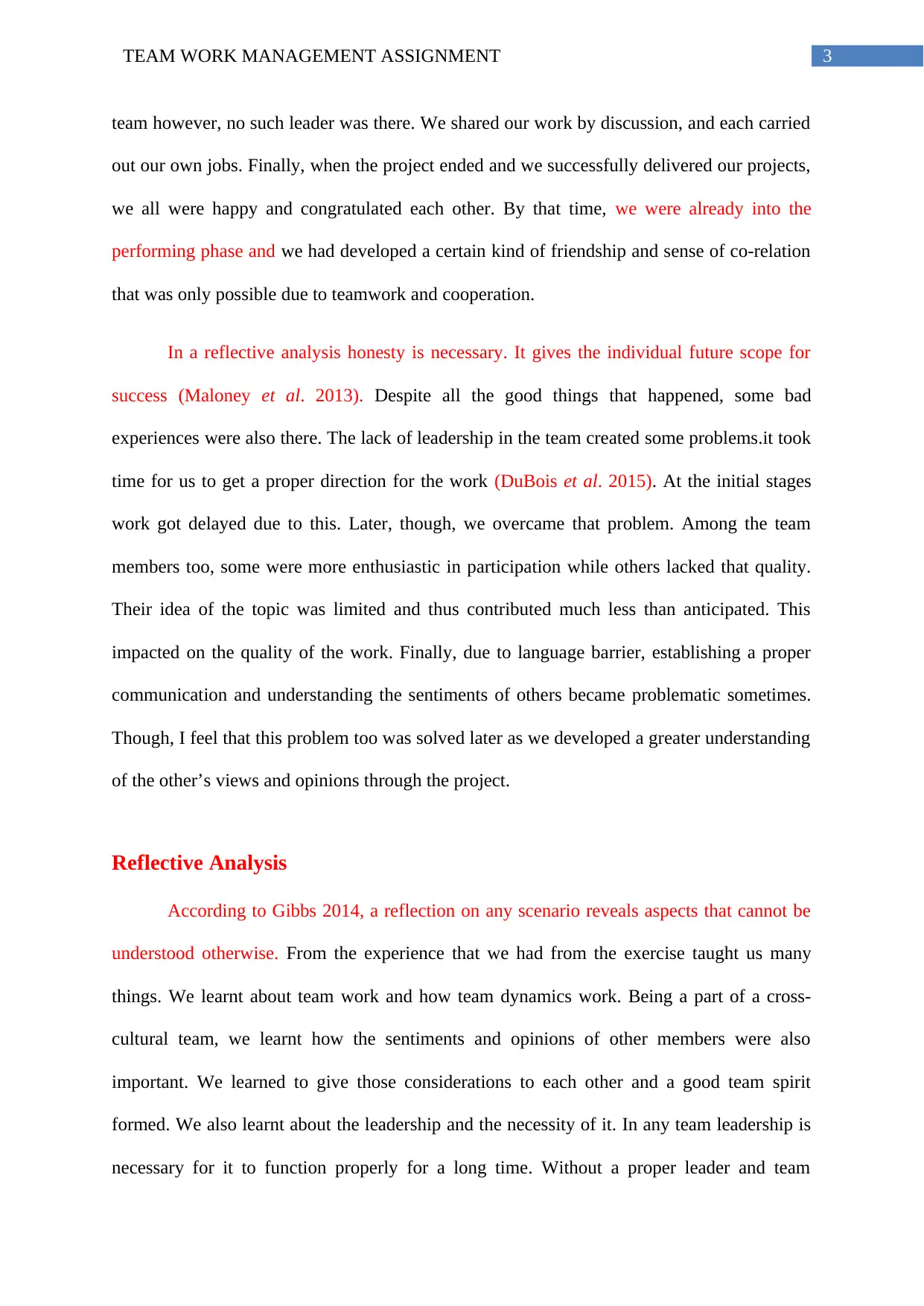
3TEAM WORK MANAGEMENT ASSIGNMENT
team however, no such leader was there. We shared our work by discussion, and each carried
out our own jobs. Finally, when the project ended and we successfully delivered our projects,
we all were happy and congratulated each other. By that time, we were already into the
performing phase and we had developed a certain kind of friendship and sense of co-relation
that was only possible due to teamwork and cooperation.
In a reflective analysis honesty is necessary. It gives the individual future scope for
success (Maloney et al. 2013). Despite all the good things that happened, some bad
experiences were also there. The lack of leadership in the team created some problems.it took
time for us to get a proper direction for the work (DuBois et al. 2015). At the initial stages
work got delayed due to this. Later, though, we overcame that problem. Among the team
members too, some were more enthusiastic in participation while others lacked that quality.
Their idea of the topic was limited and thus contributed much less than anticipated. This
impacted on the quality of the work. Finally, due to language barrier, establishing a proper
communication and understanding the sentiments of others became problematic sometimes.
Though, I feel that this problem too was solved later as we developed a greater understanding
of the other’s views and opinions through the project.
Reflective Analysis
According to Gibbs 2014, a reflection on any scenario reveals aspects that cannot be
understood otherwise. From the experience that we had from the exercise taught us many
things. We learnt about team work and how team dynamics work. Being a part of a cross-
cultural team, we learnt how the sentiments and opinions of other members were also
important. We learned to give those considerations to each other and a good team spirit
formed. We also learnt about the leadership and the necessity of it. In any team leadership is
necessary for it to function properly for a long time. Without a proper leader and team
team however, no such leader was there. We shared our work by discussion, and each carried
out our own jobs. Finally, when the project ended and we successfully delivered our projects,
we all were happy and congratulated each other. By that time, we were already into the
performing phase and we had developed a certain kind of friendship and sense of co-relation
that was only possible due to teamwork and cooperation.
In a reflective analysis honesty is necessary. It gives the individual future scope for
success (Maloney et al. 2013). Despite all the good things that happened, some bad
experiences were also there. The lack of leadership in the team created some problems.it took
time for us to get a proper direction for the work (DuBois et al. 2015). At the initial stages
work got delayed due to this. Later, though, we overcame that problem. Among the team
members too, some were more enthusiastic in participation while others lacked that quality.
Their idea of the topic was limited and thus contributed much less than anticipated. This
impacted on the quality of the work. Finally, due to language barrier, establishing a proper
communication and understanding the sentiments of others became problematic sometimes.
Though, I feel that this problem too was solved later as we developed a greater understanding
of the other’s views and opinions through the project.
Reflective Analysis
According to Gibbs 2014, a reflection on any scenario reveals aspects that cannot be
understood otherwise. From the experience that we had from the exercise taught us many
things. We learnt about team work and how team dynamics work. Being a part of a cross-
cultural team, we learnt how the sentiments and opinions of other members were also
important. We learned to give those considerations to each other and a good team spirit
formed. We also learnt about the leadership and the necessity of it. In any team leadership is
necessary for it to function properly for a long time. Without a proper leader and team
Paraphrase This Document
Need a fresh take? Get an instant paraphrase of this document with our AI Paraphraser
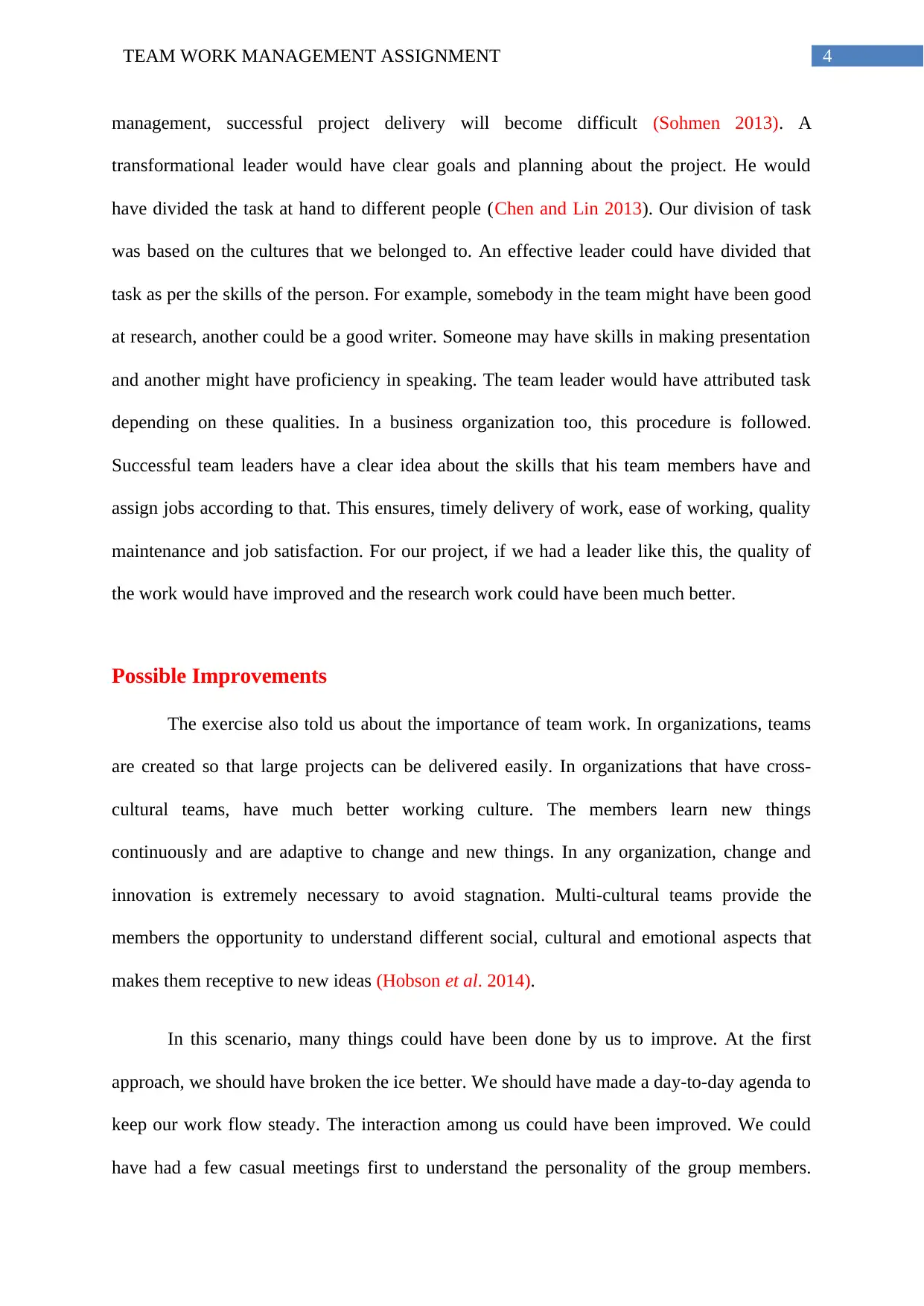
4TEAM WORK MANAGEMENT ASSIGNMENT
management, successful project delivery will become difficult (Sohmen 2013). A
transformational leader would have clear goals and planning about the project. He would
have divided the task at hand to different people (Chen and Lin 2013). Our division of task
was based on the cultures that we belonged to. An effective leader could have divided that
task as per the skills of the person. For example, somebody in the team might have been good
at research, another could be a good writer. Someone may have skills in making presentation
and another might have proficiency in speaking. The team leader would have attributed task
depending on these qualities. In a business organization too, this procedure is followed.
Successful team leaders have a clear idea about the skills that his team members have and
assign jobs according to that. This ensures, timely delivery of work, ease of working, quality
maintenance and job satisfaction. For our project, if we had a leader like this, the quality of
the work would have improved and the research work could have been much better.
Possible Improvements
The exercise also told us about the importance of team work. In organizations, teams
are created so that large projects can be delivered easily. In organizations that have cross-
cultural teams, have much better working culture. The members learn new things
continuously and are adaptive to change and new things. In any organization, change and
innovation is extremely necessary to avoid stagnation. Multi-cultural teams provide the
members the opportunity to understand different social, cultural and emotional aspects that
makes them receptive to new ideas (Hobson et al. 2014).
In this scenario, many things could have been done by us to improve. At the first
approach, we should have broken the ice better. We should have made a day-to-day agenda to
keep our work flow steady. The interaction among us could have been improved. We could
have had a few casual meetings first to understand the personality of the group members.
management, successful project delivery will become difficult (Sohmen 2013). A
transformational leader would have clear goals and planning about the project. He would
have divided the task at hand to different people (Chen and Lin 2013). Our division of task
was based on the cultures that we belonged to. An effective leader could have divided that
task as per the skills of the person. For example, somebody in the team might have been good
at research, another could be a good writer. Someone may have skills in making presentation
and another might have proficiency in speaking. The team leader would have attributed task
depending on these qualities. In a business organization too, this procedure is followed.
Successful team leaders have a clear idea about the skills that his team members have and
assign jobs according to that. This ensures, timely delivery of work, ease of working, quality
maintenance and job satisfaction. For our project, if we had a leader like this, the quality of
the work would have improved and the research work could have been much better.
Possible Improvements
The exercise also told us about the importance of team work. In organizations, teams
are created so that large projects can be delivered easily. In organizations that have cross-
cultural teams, have much better working culture. The members learn new things
continuously and are adaptive to change and new things. In any organization, change and
innovation is extremely necessary to avoid stagnation. Multi-cultural teams provide the
members the opportunity to understand different social, cultural and emotional aspects that
makes them receptive to new ideas (Hobson et al. 2014).
In this scenario, many things could have been done by us to improve. At the first
approach, we should have broken the ice better. We should have made a day-to-day agenda to
keep our work flow steady. The interaction among us could have been improved. We could
have had a few casual meetings first to understand the personality of the group members.
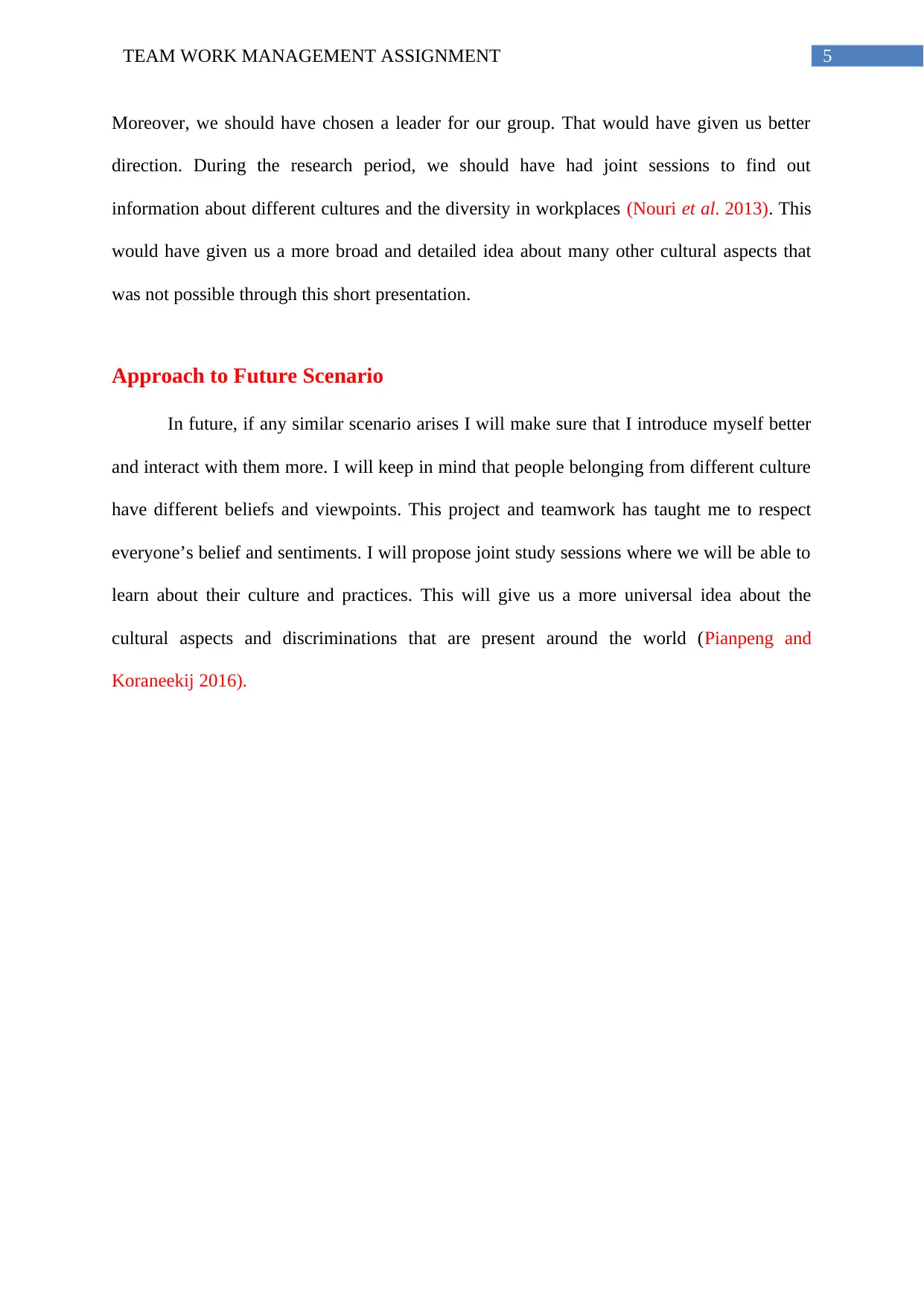
5TEAM WORK MANAGEMENT ASSIGNMENT
Moreover, we should have chosen a leader for our group. That would have given us better
direction. During the research period, we should have had joint sessions to find out
information about different cultures and the diversity in workplaces (Nouri et al. 2013). This
would have given us a more broad and detailed idea about many other cultural aspects that
was not possible through this short presentation.
Approach to Future Scenario
In future, if any similar scenario arises I will make sure that I introduce myself better
and interact with them more. I will keep in mind that people belonging from different culture
have different beliefs and viewpoints. This project and teamwork has taught me to respect
everyone’s belief and sentiments. I will propose joint study sessions where we will be able to
learn about their culture and practices. This will give us a more universal idea about the
cultural aspects and discriminations that are present around the world (Pianpeng and
Koraneekij 2016).
Moreover, we should have chosen a leader for our group. That would have given us better
direction. During the research period, we should have had joint sessions to find out
information about different cultures and the diversity in workplaces (Nouri et al. 2013). This
would have given us a more broad and detailed idea about many other cultural aspects that
was not possible through this short presentation.
Approach to Future Scenario
In future, if any similar scenario arises I will make sure that I introduce myself better
and interact with them more. I will keep in mind that people belonging from different culture
have different beliefs and viewpoints. This project and teamwork has taught me to respect
everyone’s belief and sentiments. I will propose joint study sessions where we will be able to
learn about their culture and practices. This will give us a more universal idea about the
cultural aspects and discriminations that are present around the world (Pianpeng and
Koraneekij 2016).
⊘ This is a preview!⊘
Do you want full access?
Subscribe today to unlock all pages.

Trusted by 1+ million students worldwide
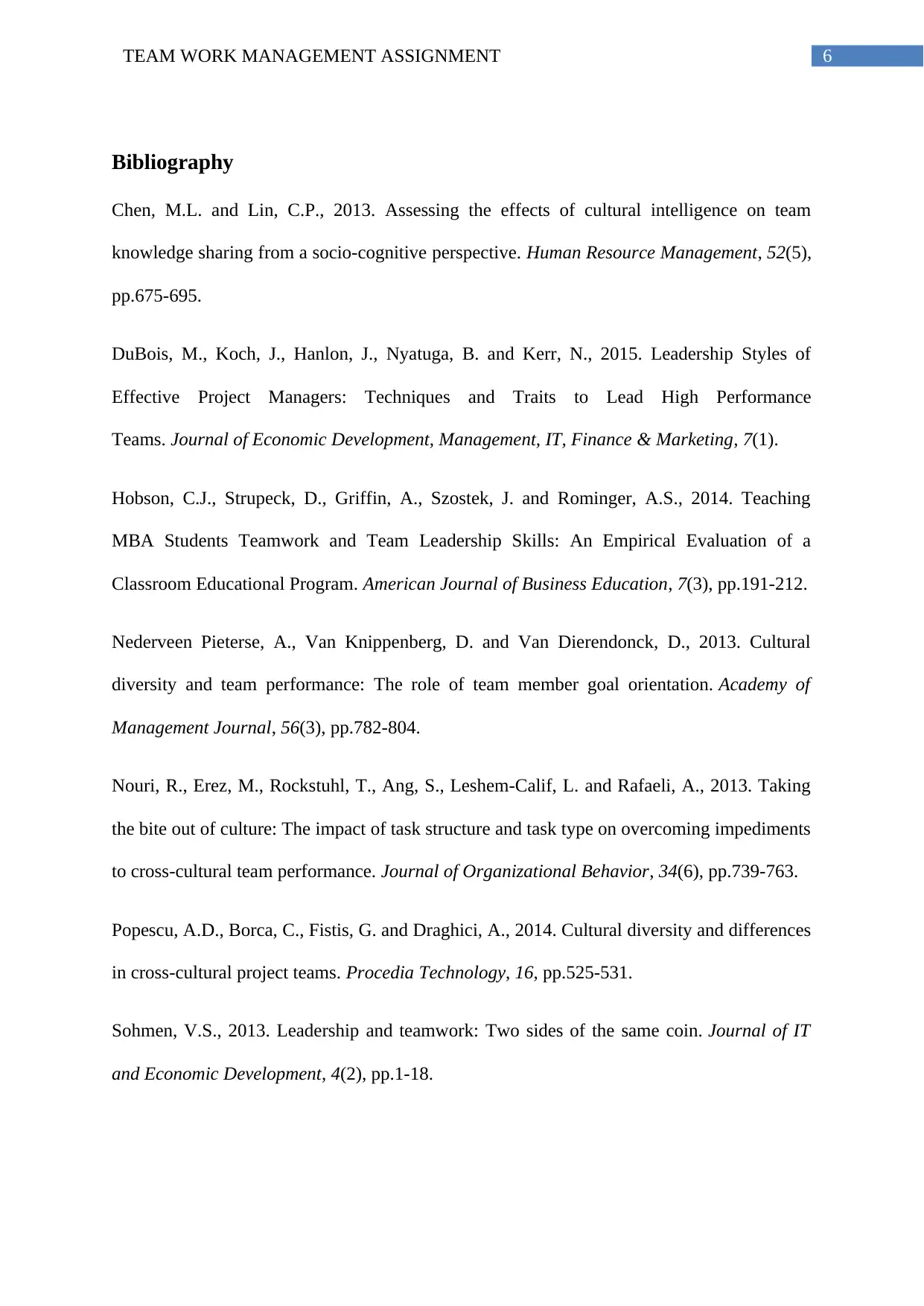
6TEAM WORK MANAGEMENT ASSIGNMENT
Bibliography
Chen, M.L. and Lin, C.P., 2013. Assessing the effects of cultural intelligence on team
knowledge sharing from a socio‐cognitive perspective. Human Resource Management, 52(5),
pp.675-695.
DuBois, M., Koch, J., Hanlon, J., Nyatuga, B. and Kerr, N., 2015. Leadership Styles of
Effective Project Managers: Techniques and Traits to Lead High Performance
Teams. Journal of Economic Development, Management, IT, Finance & Marketing, 7(1).
Hobson, C.J., Strupeck, D., Griffin, A., Szostek, J. and Rominger, A.S., 2014. Teaching
MBA Students Teamwork and Team Leadership Skills: An Empirical Evaluation of a
Classroom Educational Program. American Journal of Business Education, 7(3), pp.191-212.
Nederveen Pieterse, A., Van Knippenberg, D. and Van Dierendonck, D., 2013. Cultural
diversity and team performance: The role of team member goal orientation. Academy of
Management Journal, 56(3), pp.782-804.
Nouri, R., Erez, M., Rockstuhl, T., Ang, S., Leshem‐Calif, L. and Rafaeli, A., 2013. Taking
the bite out of culture: The impact of task structure and task type on overcoming impediments
to cross‐cultural team performance. Journal of Organizational Behavior, 34(6), pp.739-763.
Popescu, A.D., Borca, C., Fistis, G. and Draghici, A., 2014. Cultural diversity and differences
in cross-cultural project teams. Procedia Technology, 16, pp.525-531.
Sohmen, V.S., 2013. Leadership and teamwork: Two sides of the same coin. Journal of IT
and Economic Development, 4(2), pp.1-18.
Bibliography
Chen, M.L. and Lin, C.P., 2013. Assessing the effects of cultural intelligence on team
knowledge sharing from a socio‐cognitive perspective. Human Resource Management, 52(5),
pp.675-695.
DuBois, M., Koch, J., Hanlon, J., Nyatuga, B. and Kerr, N., 2015. Leadership Styles of
Effective Project Managers: Techniques and Traits to Lead High Performance
Teams. Journal of Economic Development, Management, IT, Finance & Marketing, 7(1).
Hobson, C.J., Strupeck, D., Griffin, A., Szostek, J. and Rominger, A.S., 2014. Teaching
MBA Students Teamwork and Team Leadership Skills: An Empirical Evaluation of a
Classroom Educational Program. American Journal of Business Education, 7(3), pp.191-212.
Nederveen Pieterse, A., Van Knippenberg, D. and Van Dierendonck, D., 2013. Cultural
diversity and team performance: The role of team member goal orientation. Academy of
Management Journal, 56(3), pp.782-804.
Nouri, R., Erez, M., Rockstuhl, T., Ang, S., Leshem‐Calif, L. and Rafaeli, A., 2013. Taking
the bite out of culture: The impact of task structure and task type on overcoming impediments
to cross‐cultural team performance. Journal of Organizational Behavior, 34(6), pp.739-763.
Popescu, A.D., Borca, C., Fistis, G. and Draghici, A., 2014. Cultural diversity and differences
in cross-cultural project teams. Procedia Technology, 16, pp.525-531.
Sohmen, V.S., 2013. Leadership and teamwork: Two sides of the same coin. Journal of IT
and Economic Development, 4(2), pp.1-18.
Paraphrase This Document
Need a fresh take? Get an instant paraphrase of this document with our AI Paraphraser
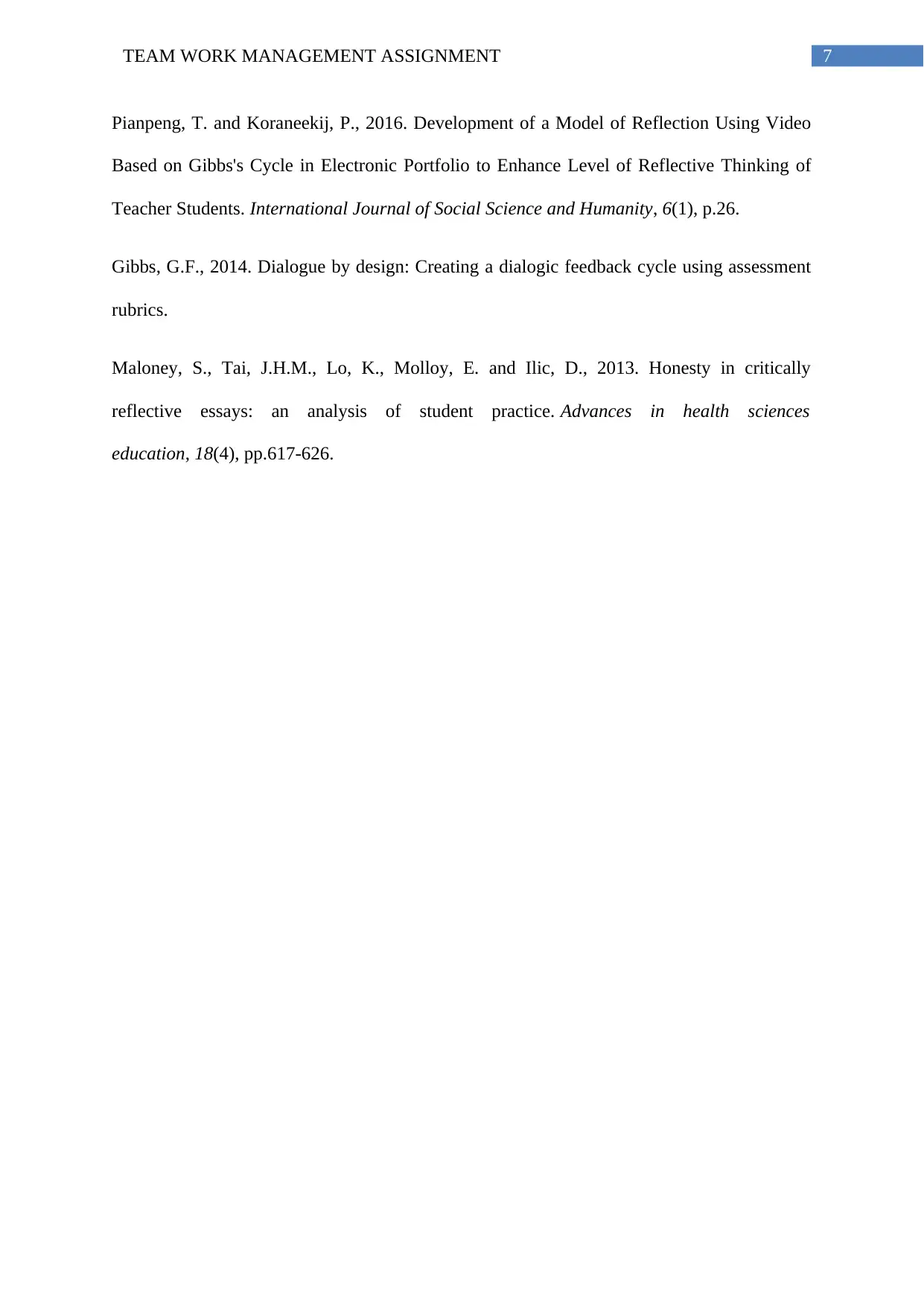
7TEAM WORK MANAGEMENT ASSIGNMENT
Pianpeng, T. and Koraneekij, P., 2016. Development of a Model of Reflection Using Video
Based on Gibbs's Cycle in Electronic Portfolio to Enhance Level of Reflective Thinking of
Teacher Students. International Journal of Social Science and Humanity, 6(1), p.26.
Gibbs, G.F., 2014. Dialogue by design: Creating a dialogic feedback cycle using assessment
rubrics.
Maloney, S., Tai, J.H.M., Lo, K., Molloy, E. and Ilic, D., 2013. Honesty in critically
reflective essays: an analysis of student practice. Advances in health sciences
education, 18(4), pp.617-626.
Pianpeng, T. and Koraneekij, P., 2016. Development of a Model of Reflection Using Video
Based on Gibbs's Cycle in Electronic Portfolio to Enhance Level of Reflective Thinking of
Teacher Students. International Journal of Social Science and Humanity, 6(1), p.26.
Gibbs, G.F., 2014. Dialogue by design: Creating a dialogic feedback cycle using assessment
rubrics.
Maloney, S., Tai, J.H.M., Lo, K., Molloy, E. and Ilic, D., 2013. Honesty in critically
reflective essays: an analysis of student practice. Advances in health sciences
education, 18(4), pp.617-626.
1 out of 8
Related Documents
Your All-in-One AI-Powered Toolkit for Academic Success.
+13062052269
info@desklib.com
Available 24*7 on WhatsApp / Email
![[object Object]](/_next/static/media/star-bottom.7253800d.svg)
Unlock your academic potential
Copyright © 2020–2026 A2Z Services. All Rights Reserved. Developed and managed by ZUCOL.





